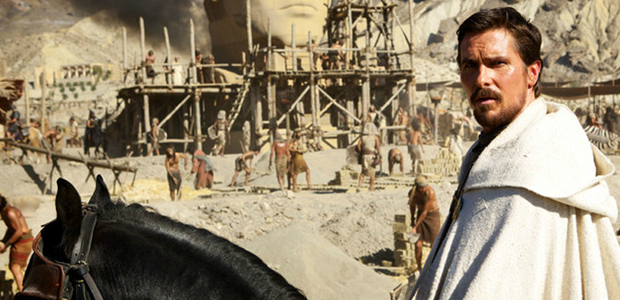As a film community, we’re often too quick to apply the label “Epic” (capitalized for proper emphasis). Dinobots made it into the latest Transformers sequel? That’s epic. Bryan Singer merged TWO X-Men universes? Of course that’s epic. Men In Black might join forces with the Jump Street crew? That would be epic! As you might guess, the term has lost impact due to years of misuse. Sir Ridley Scott’s latest, Exodus: Gods and Kings, however, earns the adjective on every level. There’s nothing small about Scott’s effort (including its mistakes), and if you bought a ticket searching for eye-popping Old Testament spectacle written on the largest piece of digital parchment, then Scott delivers you to your Promised Land.
Exodus marks a distinct left turn for its leading man, Christian Bale, how has bolstered quirky ensembles lately (usually in service of David O. Russell) but embraces the true Movie Star role of Moses. Screenwriters Steve Zailian, Jeffrey Caine and Bill Collage start their version of this oft-told story at a point where Moses and his half-brother, Ramses (Joel Edgerton), are joined at the hip in the army of Egyptian king Seti (John Turturro, one of many miscast actors). On the battlefield, however, Moses fulfills a half-baked prophecy uttered by Seti’s sketchy soothsayer, suggesting – at least in the mind of Ramses – that the adopted son of Seti is more fit to lead and eventually assume the throne of Egypt.
Elsewhere, seeds of doubt and uncertainty begin to form in Moses while he endures his own personal journey. While on a mission for Seti, Moses encounters Nun (Ben Kingsley), a Hebrew who recognizes in Moses the traits of a promised leader – a great man who one day might free the Jewish community from the harsh grip of the Egyptians and lead them back to their Holy land (even if, as Moses points out, this cherished turf isn’t quite as sacred as the Hebrews would like to believe). It isn’t until Moses begins to encounter the checklist of Biblical staples – a burning bush, a series of deadly plagues, the epic (that word again) parting of the Red Sea) – that he ultimately comes to understand in his role as mouthpiece for a much higher power.
Hollywood has not shied away from Biblical narratives this year, with distinctly different filmmakers tackling beloved stories of faith, hope and determination. If we were to compare and categorize, Ridley Scott’s Exodus: Gods and Kings would fall somewhere between the surreal mysticism of Darren Aronofsky’s fantastical Noah and the so-staid-it’s-boring conventionality of Christopher Spencer’s Son of God. Scott doesn’t take that many liberties with the Old Testament text you might have read, replaying the various plagues rained down on the house of the Pharaoh by using all of the tools at his fingertips in the year 2014. But he weaves enough mystery into the origins of these amazing spectacles to keep us invested in the “how” and the “why” of God’s miracles as we march to the film’s foregone conclusion.
If you have paid any attention to Exodus’s path to release, you know that Ridley Scott has faced criticism for his casting decisions. While I understand the rights of some people to find any reason to get upset, I have to say I disagree with the term “whitewashing” as it applies to Exodus. Never once did I regret the decision to cast Christian Bale in the role of Moses, for the actor burrows deep into the disturbed heroism of this uncertain savior and properly conveys the character’s internal and external struggles. On the flip side, Joel Edgerton fantastically portrays Ramses’ opulent entitlement by walking a razor-thin line between drama and camp. One need only to look at John Turturro’s decisions in Exodus to realize how broad and silly the entire production might have become – and quickly. Where Scott goes wrong is in the casting of qualified actors like Aaron Paul, Sigourney Weaver and Ben Kingsley, then finding little for them to do in the overall grand scheme of things. But given the fact that the central conflict between Moses and Ramses is so compelling, delivered by two powerhouse actors, these are issues that surfaced while thinking about the movie after the screening, and never during the run time as Exodus unfolded.
And that’s the ultimate conclusion on Exodus: Gods and Kings. It runs long, but is never boring. It tackles far too much story, but doesn’t feel like it strays too far or loses its way too drastically. It practices massive effects wizardry, but roots its struggles in character before it allows the digital trickery to overwhelm. Even when it misses, its mistakes are larger than life because Ridley Scott swings for the fences, and I found that admirable. I can’t imagine anyone paying for a ticket to see Scott’s vision for the larger-than-life Old Testament stories leaving the epic – yes, epic – Exodus: Gods and Kings disappointed.
Your Daily Blend of Entertainment News

Sean O’Connell is a journalist and CinemaBlend’s Managing Editor. Having been with the site since 2011, Sean interviewed myriad directors, actors and producers, and created ReelBlend, which he proudly cohosts with Jake Hamilton and Kevin McCarthy. And he's the author of RELEASE THE SNYDER CUT, the Spider-Man history book WITH GREAT POWER, and an upcoming book about Bruce Willis.

